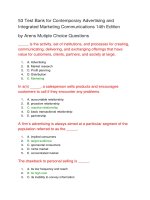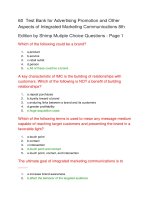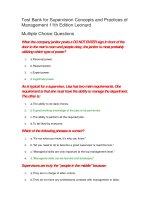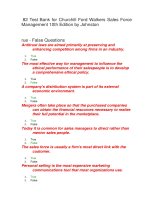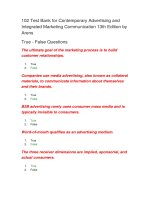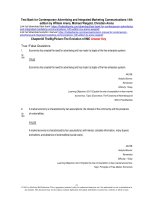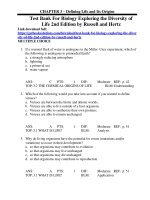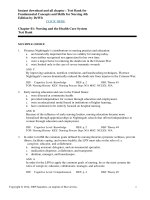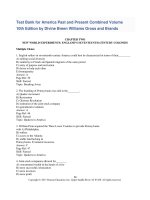Test bank for supervision concepts and practices of management 11th edition leonard
Bạn đang xem bản rút gọn của tài liệu. Xem và tải ngay bản đầy đủ của tài liệu tại đây (84.89 KB, 16 trang )
Test Bank for Supervision Concepts and Practices of
Management 11th Edition Leonard
Multiple Choice Questions
When the company janitor posts a DO NOT ENTER sign in front of the
door to the men's room and people obey, the janitor is most probably
utilizing which type of power?
1.
a.Personal power.
2.
b.Reward power.
3.
c.Expert power.
4.
d.Legitimate power.
As is typical for a supervisor, Lisa has two main requirements. One
requirement is that she must have the ability to manage the department.
The other is:
1.
a.The ability to do daily chores.
2.
b.A good working knowledge of the jobs to be performed.
3.
c.The ability to perform all the required jobs.
4.
d.To be liked by everyone.
Which of the following phrases is correct?
1.
a."It’s not what you know, it’s who you know."
2.
b."All you need to do to become a good supervisor is read this text."
3.
c."Managerial skills are only important at the top management level."
4.
d."Managerial skills can be learned and developed."
Supervisors are truly the "people in the middle" because:
1.
a.They are in charge of labor unions.
2.
b.They do not have any professional contacts with management or labor.
3.
4.
c.They report to higher management and are the employees' primary contact with
management.
d.They are in the middle-managerial level in any organization.
Ernesto and Sam witnessed their co-worker, Dave, engaging in
inappropriate behavior. They reported the incident to their supervisor,
Tina, because she has the necessary _____ to deal with the issue.
1.
a.Authority.
2.
b.Power.
3.
c.Technical skills.
4.
d.Evidence.
Successful managers will assure you that _____ are the most important
asset.
1.
a.Human Resources.
2.
b.Finances.
3.
c.Technology.
4.
d.None of the above.
Working in a team generally delivers _____ results than working alone.
1.
a.Less favorable.
2.
b.More favorable.
3.
c.Extremely favorable.
4.
d.Equal.
Achieveing coordination typically is _____ at the executive level than at
the supervisory level.
1.
a.Easier.
2.
b.More difficult.
3.
c.More fun.
4.
d.Less fun.
Which function of management is necessary because few employees
blindly obey.
1.
a.Staffing.
2.
b.Planning.
3.
c.Leading.
4.
d.Controlling.
_____ is also known as directing, motivating, or influencing.
1.
a.Staffing.
2.
b.Planning.
3.
c.Organizing
4.
d.Leading.
Changing performance standards depending on the situation is part of
which managerial function?
1.
a.Leading.
2.
b.Coordinating.
3.
c.Controlling.
4.
d.Planning.
Hot is to cold as an autocratic management style is to:
1.
a.A dictatorship.
2.
b.A domineering style.
3.
c.Repression.
4.
d.Participative management.
Guiding, teaching, and supervising employees are activities associated
with:
1.
a.Staffing.
2.
b.Leading.
3.
c.Organizing.
4.
d.Controlling.
The supervisor must be _____.
1.
a.A competent subordinate to higher level managers.
2.
b.A good follower.
3.
c.Able to maintain satisfactory relationships with supervisors in other departments.
4.
d.All of the above
Generally, it is better for a supervisor not to display _____.
1.
a.Power.
2.
b.Formal authority.
3.
c.Both a or b.
4.
d.Neither a or b.
Which of the following are the managerial functions identified in the text?
1.
a.Planning, organizing, commanding, and controlling.
2.
b.Planning, organizing, commanding, coordinating, and controlling.
3.
c.Planning, organizing, staffing, leading, and controlling.
4.
d.Planning, staffing, coordinating, leading, and controlling.
At Barry Automotive, the members of Production Team A are willing to
work with and help one another. This is called:
1.
a.Cooperation.
2.
b.Coordination.
3.
c.Leadership.
4.
d.None of the above.
The six major classifications of management capabilities and skills are:
1.
2.
a.Conceptual, administrative, technical, political, emotional intelligence, and
human relations.
b.Coordination, cooperation, conceptual, administrative, political, and technical.
3.
c.Human relations, emotional intelligence, conceptual, technical, political, and
delegation.
4.
d.Cooperation, human relations, conceptual, administrative, political, and
technical.
Managers are expected to be innovators; therefore, they must
demonstrate _____.
1.
a.Technical skills.
2.
b.Conceptual skills.
3.
c.Human relations skills.
4.
d.Political skills.
Which of the following is NOT a limitation to authority?
1.
a.Union contract provisions.
2.
b.Government or regulatory agency restrictions.
3.
c.Company policies.
4.
d.Competitors’ practices.
Some have defined coordination as one of the managerial functions. The
text suggests that coordination:
1.
a.Is an implicit interrelated aspect of the major managerial functions.
2.
b.Is not a separate managerial function.
3.
c.Takes place in all managerial functions.
4.
d.Is all of the above.
The acceptance theory of authority states that:
1.
a.The supervisor has the power and the right to issue directives in order to
accomplish the tasks assigned to the department.
2.
b.Managerial authority is not granted to an individual but rather to the position the
individual holds at that time.
3.
c.Managers do not have authority unless employees recognize and agree to it.
4.
d.It is better for a supervisor not to display power or formal authority.
Most of upper management’s time is most likely spent in the function of:
1.
a.Staffing.
2.
b.Organizing.
3.
c.Controlling.
4.
d.Planning.
More times than not, which of the following is believed to be the least
effective source of power?
1.
a.Reward.
2.
b.Coercive.
3.
c.Legitimate.
4.
d.Expert.
In order to relay information effectively, one must have good _____.
1.
a.Political skills.
2.
b.Communication skills.
3.
c.Human relations skills.
4.
d.Administrative skills.
Jonathan is a manager who always threatens people with their jobs in
order to gain compliance. He is utilizing which type of power?
1.
a.Reward power.
2.
b.Coercive power.
3.
c.Expert power.
4.
d.Legitimate power.
Supervisors who use _____ power effectively have the greatest potential
for achieving organizational goals.
1.
a.Reward.
2.
b.Legitimate.
3.
c.Both.
4.
d.Neither.
Networking _____ coordination efforts.
1.
a.Presents more challenges during.
2.
b.Eases.
3.
c.Has no impact on.
4.
d.None of the above.
Which of the following is NOT generally considered to be true?
1.
a.The manager relies on control; the leader inspires trust.
2.
b.The manager focuses on systems and structures; the leader focuses on people.
3.
c.The manager accepts the status quo; the leader challenges it.
4.
d.The manager is a follower; the leader leads.
Matthew has recently put a new plan for his department into place. He
wants to make certain that the plan is working as was intended. He is
conducting the managerial function of:
1.
a.Staffing.
2.
b.Leading.
3.
c.Organizing.
4.
d.Controlling.
True - False Questions
The growing diversity among employees has contributed to the increased
use of teams in the workplace.
1.
True
2.
False
When most companies appoint a new supervisor, the supervisor is
selected based on his/her technical competence, willingness to work hard,
and prior performance.
1.
True
2.
False
There is a growing realization that an autocratic, coercive management
style results in more productive, loyal employees.
1.
True
2.
False
Managers must get things accomplished with and through people by
guiding them and motivating their efforts toward common objectives.
1.
True
2.
False
A supervisor’s professional power depends to a greater extent on the
follower’s perceptions of that supervisor’s knowledge, skill, and
expertise.
1.
True
2.
False
Cooperation is the process by which supervisors become connected with
other individuals or groups to achieve particular goals.
1.
True
2.
False
Delegation is the process of entrusting duties and related authority to
subordinates.
1.
True
2.
False
Planning can best be defined as preparation for the future.
1.
True
2.
False
The staffing function is nothing more than selecting the right employees
to complete the task.
1.
True
2.
False
Administrative skills include the ability to plan, organize, and coordinate
the activities of a work group.
1.
True
2.
False
Many companies are using the terms "associate" or "team member" in
place of "supervisor."
1.
True
2.
False
Technical skills involve the ability to plan, organize, and coordinate
activities.
1.
True
2.
False
The ability to work with people is an important human relations skill.
1.
True
2.
False
While cooperation is helpful and the lack of it could impede progress, its
presence alone will not necessarily get the job done.
1.
True
2.
False
A group of employees do not become a team until its members share
values and purpose.
1.
True
2.
False
A role of the supervisor is to do all those things that enable employees to
effectively and efficiently achieve organizational objectives.
1.
True
2.
False
It is not necessary for supervisors to delegate authority to lower levels for
an organization to be effective.
1.
True
2.
False
The only skills a supervisor needs in order to be effective are technical
and human relations skills.
1.
True
2.
False
Managerial authority is not granted to individuals, but rather to the titles
that they hold.
1.
True
2.
False
A supervisor is an employee's primary contact with management.
1.
True
2.
False
Legitimate power is based on the rank that a person holds in an
organization.
1.
True
2.
False
The primary managerial functions differ depending on the manager's level
within the managerial hierarchy.
1.
True
2.
False
Conceptual skills include the ability to ascertain the hidden rules of an
organization.
1.
True
2.
False
Managers innovate; leaders administer.
1.
True
2.
False
Generally, it is better for a supervisor to display power and formal
authority.
1.
True
2.
False
The supervisory role is a difficult and demanding role because
supervisors are people “in the middle.”
1.
True
2.
False
Team-based organizational structures commonly focus on customer
satisfaction, productivity, profitability, and continuous improvement.
1.
True
2.
False
The process of relegating authority to lower levels in the hierarchy is
required for an organization to have effective managers, supervisors, and
employees.
1.
True
2.
False
An arbitrator is a person selected by the union and management to
provide recommendations as to how a grievance could be resolved.
1.
True
2.
False
The five functions of management can be viewed as a circular, continuous
movement as each function flows into and overlaps with other functions.
1.
True
2.
False
Teams are a means to an end, and that end is superior performance to
what team members would achieve working as individuals.
1.
True
2.
False
The time and effort involved in each function of management will vary
depending upon the level of the hierarchy in which the manager is a
member.
1.
True
2.
False
An accounting supervisor typically meets with supervisors from
production, sales, and shipping to coordinate cost accounting, inventory
records and billing. This is using the process of cooperation.
1.
True
2.
False
Arranging and distributing work among members of the work group to
accomplish the organizatin’s goals take place in the staffing function.
1.
True
2.
False
In the controlling function supervisors evaluate performance to ensure
actual performance is in line with intended performance and changes are
made if outcomes are not being met.
1.
True
2.
False
For a supervisor, having referent power means that the supervisor can
refer his employees to the appropriate person in the organization who is
capable of answering their questions.
1.
True
2.
False
According to Havard professor John P. Kotter, management involves
keeping the current system operating through planning, budgeting,
staffing, controlling, and problem-solving, while leadership is the
development of vision and strategies.
1.
True
2.
False
Free Text Questions
On what four elements is the team-based organizational structure
focused?
Answer Given
Customer satisfaction, productivity, profitability, and continuous improvement.
What are the two main requirements of any supervisory position, and
which of these usually determines the effectiveness of a supervisor's
performance?
Answer Given
The supervisor must have a good working knowledge of the jobs to be performed
and must be able to manage the department. The latter of these usually
determines the supervisor's effectiveness.
Is leadership the same thing as management? Why or why not?
Answer Given
Leadership is not synonymous with management. Leadership is vision as to what
must be accomplished, and the strategies that are involved in reaching that vision.
Leadership also entails assembling the relevant people who will support those
strategies. Management involves doing the right things and keeping the current
system operating through planning, budgeting, staffing, controlling, and problemsolving. In an ideal setting, individuals would have a blend of both good
management and leadership skills. Management without leadership buries
organizations in a great deal of bureaucracy. Leadership without management
runs the risk of chaos and disorder in organizations.
Tony and Scott know that they need to forge an alliance with Alicia, who is
the smartest person in their department about how to get things done.
What type of power does Alicia probably possess?
Answer Given
Alicia probably possesses expert power, as she is viewed as being one of the
more knowledgeable people in the organization.
What is the role of an arbitrator?
Answer Given
An arbitrator is someone who is selected by the union and management to render
a final and binding decision concerning a grievance when these two parties cannot
settle it themselves.
Which managerial function should be done first? What does it consist of?
Answer Given
The managerial function of planning should be done first. Planning includes
setting goals, objectives, policies, and procedures.
Why are supervisors wise to avoid relying on managerial authority to
motivate employees?
Answer Given
Approaches that foster mutual trust and respect between a supervisor and his/her
subordinates generally result in increased job satisfaction and, consequently,
higher productivity. Employees are likely to perform better if they understand why
a task needs to be done rather than simply being told to do it. Supervisors who
display their power and formal authority are likely to produce unhappy,
unproductive workers.
What is emotional intelligences? How can it help you?
Answer Given
Emotional intelligence is the use of emotions to help guide your behavior. It can
help you think in ways that enhance results.
